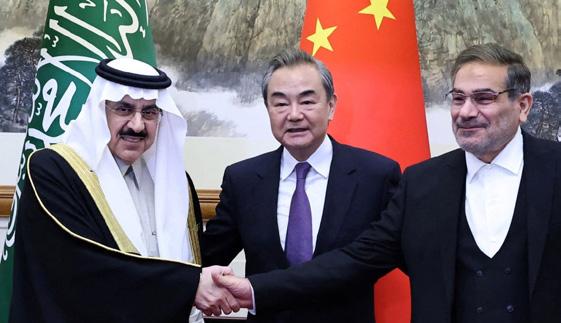
3 minute read
WORLD THIS WEEK
In collaboration with National Institute for Advanced Studies, Bengaluru
Authored by
Advertisement
Rashmi Ramesh, Harini Madhusudan, Ankit Singh, Akriti Sharma, Avishka Ashok, Anu Maria Joseph, Apoorva Sudhakar, Padmashree Anandhan and Femy Francis
Saudi Arabia: Resumption of diplomatic ties with Iran
regional states/actors/territories including Iraq, Oman, Qatar, Bahrain, UAE, Turkey, Egypt, Syria, Lebanon, Palestinian Authority, Lebanese Hezbollah and the Houthis of Yemen.
of NATO military infrastructure into Asia, while making a serious bet on many years of confrontation in the region.
What happened?
On 10 March, Iran and Saudi Arabia agreed to restore diplomatic relations seven years after the ties were severed. The delegations reached an agreement in talks hosted by China during 6-10 March. Ali Shamkhani, the secretary of the Supreme National Council of Iran met Musaad bin Mohammed al-Aiban, Saudi Arabia’s national security advisor, in the presence of Wang Yi, China’s foreign minister. The Joint Trilateral Statement thanked Iraq and Oman for hosting multiple rounds of dialogues in 2021 and 2022. The foreign ministers of Iran and Saudi Arabia will meet to implement the agreement. Regarding the practical aspects, the Statement mentioned that reopening embassies and missions within the next two months will be a priority. It also reaffirmed the commitment to non-interference in internal affairs, upholding sovereignty, and re-implement the 2001 Security Cooperation Agreement between the two countries.
The UN Secretary General Antonio Guterres welcomed the agreement and said that this was an important step towards achieving regional stability. On 15 March, the UNSC held a meeting on the situation in Yemen, where the agreement was received positively. The UN Special Envoy for Yemen called on the parties to the conflict to carry forward the advantages of the agreement to ensure peace in Yemen. The rapprochement was welcomed by majority of
Israeli politicians denounced the development and the opposition blamed PM Netanyahu for failing to isolate Iran. Former PM Yair Lapid called the agreement “dangerous foreign policy failure of the Israeli government… a collapse of the regional defence wall” that was being built against Iran. The White House spokesperson remarked that Saudi Arabia informed it about the talks, but Washington was not directly involved in the process. What does it mean?
First, the regional impact. Lebanon’s PM Najib Mikati said that the agreement “is an opportunity to breathe in the region, and look to the future.”
Indeed, most leaders hope that this is a positive beginning and an end to the rivalry that manifested through proxy conflicts. Though there is a relative calm except in a few pockets such as Ta’iz and Ma’rib, the eight-year Yemen conflict is yet to find an end. A revival of ties between Iran and Saudi is a hope for concrete peace, and probably will be one of the priorities on the agenda. The UN-brokered truce has expired in Yemen, yet Saudi is now directly talking to the Houthi leadership. However, the conflict is a complex one, with multiple actors and interests involved. The reconciliation can provide a breakthrough, but the conflict cannot end until domestic actors consider peace as an option in Yemen.
In Syria, Saudi and Iran support opposing sides. Indicating a change, the Arab states are warming up to President Bashar al-Assad in recent times. Direct talks, and visits have increased since the earthquake struck Turkey and Syria in February this year. The reconciliation can provide impetus to reintegrating Syria into the regional fold after a long period of isolation. In Iraq, Iran’s strong political hold has often dissuaded Saudi Arabia’s investments. It is in Iraq’s interest to see Tehran and Riyadh talking. The impact of the agreement is yet to be seen in Lebanon’s case. Saudi Arabia’s political landscape might improve, but Iran may not be ready to give up its political gains made through Hezbollah. Second, Israel’s tricky position. Israel works towards containing and isolating Iran and has lobbied strongly for it in the case of JCPOA. It has also regularly targeted Iranian installations, armament supplies and affiliated groups in Lebanon and Syria by conducting air strikes. However, Saudi Arabia talking to Iran has started a political blame game in Tel Aviv, projected as a failure of Netanyahu’s government. In his previous tenure, Netanyahu showcased Abraham Accords as his government’s most important success, and aimed for normalization with Saudi. But with Iran and Saudi warming up, it may not be an easy path to tread.
Third, waves of ground-breaking diplomacy. The Abraham Accords aimed at integrating Israel in the region. Iran and Saudi resuming talks, looks for bilateral and regional peace. The two comprehensive diplomatic initiatives in Middle East in recent years, are the defining moments in the foreign policies of many states involved. With both initiatives working simultaneously, it is clear that some regional actors are willing to engage with Israel and also not favour an isolated Iran.









